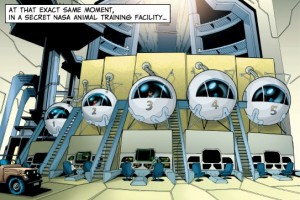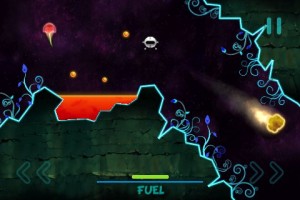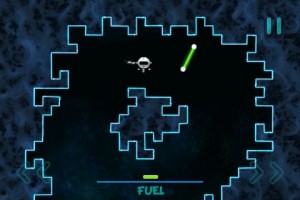When the planet Saturn miraculously transforms from a gas giant into an Earth-like environment filled with untapped resources and living space, what is humankind to do? Luckily NASA has a no-brainer contingency plan for these kinds of situations: load up a spacecraft with the world’s best trained chimpanzee and as many freeze-dried bananas as it’ll take to keep him happy during the long trip out. The story of this fantastic voyage plays out against wonderfully illustrated comic book style images; while we’ve seen videogame narration delivered this way before in successful iOS titles, 6th Planet (Out Now, $2.99) takes it to a whole new level by offering literally an entire comic book’s worth of story interspersed among the game’s 50 levels. The stellar attention to narrative here really has to be seen to be believed.
6th Planet‘s story panels will at first strike the player as strangely divorced from the game’s levels, delving deeply into the background of space chimp Darius’ mission rather than providing a fluid context for the levels themselves. However, a few hours in and the player finds that Monkube & co.’s narrative setup is purposeful: the outlandish space mazes the player believes are Darius’ endeavors appear to be the very simulations meant to keep the chimp in practice while he hurtles toward his ultimate Saturnian landing.
 If that sounds disappointingly like a cheap M. Night Shyamalan twist, not to worry — the exact nature of the game’s levels are one of many questions planted in the player’s mind and gradually probed with the kind of subtle narrative skill the videogame industry could benefit from more of in general. Darius gets a backstory that players might just find more interesting than that of many a human comic book hero, and the sad reality underlying his voyage makes for one of the most gripping chimp-centric plots since the 1987 film Project X. The plot is not without a cheesy trope or two, but once it gets rolling the player will be as eager to see the next cutscene as Darius is to pound down his next banana slurpee.
If that sounds disappointingly like a cheap M. Night Shyamalan twist, not to worry — the exact nature of the game’s levels are one of many questions planted in the player’s mind and gradually probed with the kind of subtle narrative skill the videogame industry could benefit from more of in general. Darius gets a backstory that players might just find more interesting than that of many a human comic book hero, and the sad reality underlying his voyage makes for one of the most gripping chimp-centric plots since the 1987 film Project X. The plot is not without a cheesy trope or two, but once it gets rolling the player will be as eager to see the next cutscene as Darius is to pound down his next banana slurpee.
Whatever the nature of 6th Planet‘s levels from a plot standpoint, they offer a paragon of game design perfection. Darius’ practice missions are essentially an iteration of the well-worn Lunar Lander concept, in which the player operates the thrusters of a spacecraft so as to make a soft touchdown on a landing pad, his or her actions constrained by the vehicle’s fuel supply. Many a gamer already knows the drill, but what makes it worth another go-around in 6th Planet is just how polished and complex the level designs become. Rather than hover over barren moonscapes, the player must thread Darius’ landing pod through scrolling mazelike structures filled with all manner of moving traps, belching gases, and bizarre space creatures that will crush the vehicle instantly if given an opportunity.
 6th Planet sports OpenFeint support but this is really a secondary perk compared to the in-game medal system: completing levels with high performance ratings unlocks secret missions with their own bizarre gameplay twists and even entire additional modes beyond the game’s 50-level story mode. Player performance is measured in fuel remaining upon successful landing, with the player encouraged to use 6th Planet‘s spot-on physics to his or her advantage in minimizing fuel consumption. One really has to make a stretch to find flaws in 6th Planet‘s game’s design, but the closest thing to a complaint is the frustration some players will feel when confronted with the prospect of having to memorize a level’s layout over successive attempts in order to surmount the most complex missions. Nevertheless, the rate at which the landing craft’s fuel gauge depletes varies widely from level to level, giving the player plenty of wiggle room to effectively respond to new traps in the vast majority of cases.
6th Planet sports OpenFeint support but this is really a secondary perk compared to the in-game medal system: completing levels with high performance ratings unlocks secret missions with their own bizarre gameplay twists and even entire additional modes beyond the game’s 50-level story mode. Player performance is measured in fuel remaining upon successful landing, with the player encouraged to use 6th Planet‘s spot-on physics to his or her advantage in minimizing fuel consumption. One really has to make a stretch to find flaws in 6th Planet‘s game’s design, but the closest thing to a complaint is the frustration some players will feel when confronted with the prospect of having to memorize a level’s layout over successive attempts in order to surmount the most complex missions. Nevertheless, the rate at which the landing craft’s fuel gauge depletes varies widely from level to level, giving the player plenty of wiggle room to effectively respond to new traps in the vast majority of cases.
With the complexity of 6th Planet‘s gameplay resting entirely on level design, Monkube seized the opportunity to leave its user interface delightfully simple. Darius’ landing pod is operated via two virtual buttons corresponding to right and left directionality, with an upward thruster enabled by pressing both simultaneously. The thruster virtual buttons could stand to be a tad less transparent at times, but even when they compete with environments in the player’s peripheral vision, their activation areas are generous enough that I never experienced any difficulty with interface reliability.
 6th Planet‘s beautifully rendered story panels appear as if they jumped straight out of a glossy Marvel comic book – no big surprise here, seeing as Monkube summoned a veteran Marvel artist among their numerous collaborators – but the levels themselves are no slouches either, with highly varied environments that keep the player’s experience visually fresh over the game’s impressive length. Music consists of suitably spacey ambience. Monkube advertises a play time of at least four hours, but assuming the player is as untrained an astronaut as I am, he or she can expect to spend a solid five to eight hours on the story mode, not counting revisiting completed levels to bump up performance records and unlock extra non-story modes.
6th Planet‘s beautifully rendered story panels appear as if they jumped straight out of a glossy Marvel comic book – no big surprise here, seeing as Monkube summoned a veteran Marvel artist among their numerous collaborators – but the levels themselves are no slouches either, with highly varied environments that keep the player’s experience visually fresh over the game’s impressive length. Music consists of suitably spacey ambience. Monkube advertises a play time of at least four hours, but assuming the player is as untrained an astronaut as I am, he or she can expect to spend a solid five to eight hours on the story mode, not counting revisiting completed levels to bump up performance records and unlock extra non-story modes.
iFanzine Verdict: Just when you’d think another iteration of “land the space pod” would be terribly bland against the backdrop of the wider iOS gaming library, Monkube & co. have come along and polished the concept to such a level of perfection as to make it impossible to overlook. 6th Planet might go down in history as having one of the most memorable story presentations among App Store offerings, but anyone who doesn’t immediately write off its premise will find its gameplay just as easy to fall in love with.


